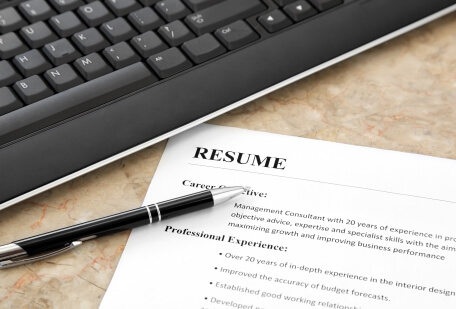8 Red Flags to Avoid When Hiring

The hiring process can be a rocky journey involving dozens of candidates and weeks of interviews. Although a painstaking process, finding the right employee for the job is crucial, and the choice should never be rushed. Employees are the ambassadors of your brand, not to mention the money your company invests in each new employee. It costs an average of five times their yearly salary just to go through the first year of training and employment. Carefully studying resumes, checking previous job history, and meeting face-to-face to get to know the contenders takes time. Many companies even hold multiple in-person interviews with candidates to decide if they fit the criteria.
Once the obvious applicants have been cut because of inexperience or other shortcomings, the hard work starts. Look for these eight red flags to weed out the candidates that may spell trouble for your company.
1. Showing up Unprepared
Showing up for an interview unprepared demonstrates that a candidate really just wants a job—any job—and has no interest in finding a best-fit work environment. Applicants should come prepared to discuss the job and how it adds value to the company as a whole. Asking the candidate about basic information that can be found on the company website will quickly reveal if the person has done even the most basic research.
If the interview starts with the applicant blanking on questions about the company background, cross them off the list. The candidate knows nothing about your company and lacks the motivation to do the simplest research. This lazy behavior is a big red flag for employers.
2. Arriving Late
Showing up on time or early for an interview tells you that the potential employee values your time. They are prepared, researched how to find your office beforehand, and probably even did a practice drive to choose the best route. This planning tells you the applicant understands the importance of the opportunity, and they likely have prepared for the interview in other ways as well.
Candidates that arrive late convey that an interview is of little importance to them and show a low level of respect for you and the company. They did not put in the time to consider driving directions, so why would they prepare in other ways? Tardiness happens once in a while, but if it happens on the day of an important interview, it may signal that a candidate does not value punctuality in everyday life.
While emergencies happen, a tardy interviewee is never a good sign. If the candidate does not seem to understand the importance of your time, move on to the next one.
3. Wearing Inappropriate Attire
Dress for the job you want, not the job you have! We all know the common expression, yet interviewees still make the mistake of showing up in jeans and t-shirts. Job candidates that take pride in their appearance will also take pride in their work.
Whether the candidate chooses clothing that is too revealing, too casual, or just plain bizarre, what they wear makes a statement about who they are in general. Sloppy dress and wrinkled or worn clothing could indicate that they will produce sloppy, half-hearted work. This red flag should be an obvious one and will tell you a lot about the applicant even before they open their mouth. Pay attention to these details, and you might avoid making a huge hiring mistake.
4. Poor Body Language
Nervousness is common during job interviews, but if the candidate slumps in their chair, fidgets, and mumbles through the interview, you may want to pass. A person who conveys initial weakness rarely shows strength in their future performance.

Look for interviewees that possess strong self-confidence and an upbeat attitude. These candidates sit straight, make eye contact, and speak with clear purpose. Self-confidence shines through in daily work. Employees that know how to express that confidence and believe in themselves will produce stronger results for your team.
5. Trash Talking Past Bosses or Sharing Confidential Information
Everyone has had that boss or coworker with whom they simply did not get along. People often disagree with processes or attitudes in the workplace, leading to pent-up animosity. An interview is not the place to air past grievances and complain about these issues.
A great candidate takes the high road and avoids trash talking in an interview. Instead, they highlight their solutions to problems that arose in the workplace. Any employee can engage in a workplace disagreement, but a great employee finds the root of the issue and then works to resolve it.
This is a major red flag that should not be ignored in the interview process. After all, if you hire a trash talker, what’s to stop them from turning on you or other employees in the future?
6. Passing the Blame
Have you ever asked someone about a work issue only to have everyone but that person blamed? Candidates that cannot take responsibility for mistakes and failures in the past probably won’t learn to own up to future errors. This red flag leads to team communication issues and arguments within the office.
Admitting mistakes shows maturity and responsibility in a person, while passing the blame reveals major character weakness. There is no reason to waste your time on an applicant that habitually passes the blame to other teammates. This person will break down team bonds and cause rifts within your workplace. If an applicant points out the failures of coworkers more often than they explain how they fixed a problem, cut this interview short.
7. No Work, Just Perks
A potential employee that is interested only in the extras probably does not really care about the actual work. This type of employee will punch the clock and end up being flaky when it comes to attendance and work deadlines. While the work/life balance is an important aspect for every employee, candidates that lean heavily to the life side do so at the expense of their work. The best hires know that to get to the fun stuff, the work must get finished first.
People that work for the weekend care only about what you can do for them. Their main priority is having fun, not succeeding at the job. Asking repeatedly about office perks instead of focusing on the job description is a red flag in the interview process.
8. Ending the Interview without Questions
“Do you have any questions for me?” If you ask this question and the only response you get is a blank look, you should probably reconsider offering the position. Even if the candidate did not come in with a list of prepared questions, or if you answered most during the interview, they should have picked up something during your interaction.
Whether they ask a question about the culture of the office or simply clarify an earlier statement, a great candidate wants to know more about the workplace. Most candidates know how to answer interview questions, but if they cannot ask their own questions, they lack the inquisitive mindset that produces great employees.
The interview process is time-consuming and can be frustrating, but finding a team member that understands the culture of your workplace is invaluable. While tardiness, ill-fitting clothing, or frowning at the name of an ex-boss may not mean immediate cause for alarm, a mix of these eight red flags typically indicates a bad fit. Take the extra time to hire great candidates that contribute their expertise to the team’s overall success.








